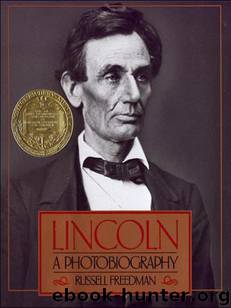Lincoln: A Photobiography by Russell Freedman

Author:Russell Freedman [Freedman, Russell]
Language: eng
Format: epub
ISBN: 0899193803
Publisher: Houghton Mifflin Harcourt
Published: 2012-05-05T16:51:36+00:00
Many recruits on both sides of the Civil War were scarcely more than boys This is a portrait of Edwin Jennison, a Georgia private, killed in action at Malvern Hill on July 1, 1862.
Union forces are routed at the Battle of Bull Run—the first major engagement of the war.
Until now, Lincoln had turned for strategic advice to his general in chief, seventy-five-year-old Winfield Scott. Scott had proposed his famous "anaconda plan" to surround the South and squeeze it into submission—a blockade of the Southern coast and occupation of the Mississippi River. Lincoln felt that the plan didn't go far enough. He wanted his commanders to take the offensive wherever they could. After Bull Run, he resolved to tighten the naval blockade, call up more troops for longer enlistments, and launch three offensives at once—into Virginia, into Tennessee, and down the Mississippi.
He gave command of the Eastern armies to General George B. McClellan, a thirty-five-year-old veteran of the Mexican War. McClellan was vain, pompous, and opinionated, but Lincoln had faith in him. The president brushed off criticism of the general's rude behavior by saying, "Never mind. I will hold McClellan's stirrups if he will bring us victory."
McClellan trained his growing army with meticulous care, but as the months passed, he showed no signs of moving against the rebel forces massed in Virginia. "Don't let them hurry me, is all I ask," he said. When the first snows fell at the end of 1861, McClellan's troops were not yet ready for battle. On the western front, it was the same story. Union commanders built up their forces and drilled their men, but they weren't ready to fight.
Congress and the public were losing patience. Why weren't the generals fighting? Was Lincoln too inexperienced to handle his job? A Congressional committee began to investigate the conduct of the war. Generals were called in from the field to testify on Capitol Hill.
Lincoln, too, was tired of the delays. But he wasn't a military man himself, and he was reluctant to overrule his commanders. And he had other troubles besides—corruption in the War Department, angry disputes within his cabinet, and mounting criticism from Congress. Senator Benjamin F. Wade of Ohio called the Lincoln administration "blundering, cowardly, and inefficient."
By now, the president had serious misgivings about the professional soldiers who were running the war. He had collected a library of books on military strategy, and he studied them late into the night, just as he had once studied law and surveying. Attorney General Edward Bates had told Lincoln that it was his presidential duty to "command the commanders.... The nation requires it, and history will hold you responsible." Lincoln began to play an active role in the day-to-day conduct of the war, planning strategy and sometimes directing tactical maneuvers in the field.
Download
This site does not store any files on its server. We only index and link to content provided by other sites. Please contact the content providers to delete copyright contents if any and email us, we'll remove relevant links or contents immediately.
Pale Blue Dot by Carl Sagan(3993)
Pocahontas by Joseph Bruchac(3717)
Unfiltered by Lily Collins(3609)
Cracking the GRE Premium Edition with 6 Practice Tests, 2015 (Graduate School Test Preparation) by Princeton Review(3590)
The Emotionary: A Dictionary of Words That Don't Exist for Feelings That Do by Eden Sher(2944)
Factfulness_Ten Reasons We're Wrong About the World_and Why Things Are Better Than You Think by Hans Rosling(2750)
The President Has Been Shot!": The Assassination of John F. Kennedy by Swanson James L(2729)
The Daily Stoic by Holiday Ryan & Hanselman Stephen(2701)
Rogue Trader by Leeson Nick(2467)
Sapiens and Homo Deus by Yuval Noah Harari(2403)
Gettysburg by Iain C. Martin(2322)
The Rape Of Nanking by Iris Chang(2321)
Almost Adulting by Arden Rose(2293)
500 Must-Know AP Microeconomics/Macroeconomics Questions(2236)
The Plant Paradox by Dr. Steven R. Gundry M.D(2032)
In the Woods by Tana French(1984)
Make by Mike Westerfield(1966)
The 48 laws of power by Robert Greene & Joost Elffers(1892)
The 7 Habits of Highly Effective People: Powerful Lessons in Personal Change (25th Anniversary Edition) by Covey Stephen R(1836)
